Improvisation
Bíborka: Welcome to PUHA podcast, which stands for Performative Unity in the Hungarian Arts produced for HowlRound Theatre Commons, a free and open platform for theatremakers worldwide. We are your hosts Zsófi and Bíborka.
Welcome everyone. This PUHA podcast will be about improvisation and yeah. Welcome to our guests. Welcome to our listeners. I'm Biborka. There's also Zsófi.
Zsófi: Hi, I'm Zsófi.
Bíborka: And let's start by going around and introducing yourself.
Ernő Zoltán Rubik: Okay, so my name is Ernő. I'm a composer and improviser based in music. So I learned music composition at the Liszt Ferenc Music Academy, and I play piano and objects. I use voice quite often. I work in theatre shows and sometimes movies to create soundtrack, but the majority of my work is now around improvisation. And I'm also extending all of it to the field of dance. I love to dance, this is my passion.
Zoltán Grecsó: My name is Zoltán Grecsó. I'm a dance performer, and thirteen years ago I started to organize an improvisation evening. And then it's turned out to be a collective and now we, all together with sixteen dancers, we are improvising a lot. We are organizing improvisation performances and we have improvisation nights where we... usually, what our theme is that we have no concept at all. I teach in the Hungarian Dance University and I have a lot of different projects as well beside that. And I teach amateurs as well.
Viola Levai: I'm Viola Levai, and I finished at the Budapest Contemporary Dance Academy. I work as a dancer—also in improvisation, also in concepted pieces—and I also teach dance. And I'm also doing community things which these are all connected to dance or based on dance with musicians, with other kind of collaborations.
Bíborka: I would like you all to give a one sentence definition of improvisation. What is improvisation?
Viola: Find it again and again. And lose it again and again.
Ernő: Improvisation is the celebration of life.
Viola: Yes.
Zoltán: So my sentence is, “Just do it and accept it.”
Bíborka: Great. Thanks. And now if you want to say how you found your way to improvisation and how do you work with it now? Why is it important to you? Is it important to you? Maybe it's not important to you.
Zoltán: In dance education, there is a lot of exercises or tools to develop your improvisation dance skills. And of course over and over we can practice all these exercises and all these tools to develop in a way of getting ourselves, getting our way of moving and the way how we receive the informations about what we are doing in the moment. So, this is a long-term process. Probably it's a never-ending story. I can always find something interesting for me to recognize about myself and about the way how I move.
Ernő: Yeah, I wanted to say that the second sentence would be composing in the present moment—for after my first sentence. But then, okay, how to compose in the present moment? For me, I like to be quite conscious about this. So for me it's a conscious composition. And even if I use just letting it go and I just entered the flow and let my body move or I throw my brain away and just act, that can be also a conscious decision. And maybe the most important element in this composition is listening. Sergio Murayama, who is an improvising musician playing percussion and voice, and that his motto is listening first, then playing.
Viola: So I also can really connect to a listening and there is another word, but I wanted to say that... the acceptance. So somehow the state of mind when you are free to do things but you are conscious about these and you are not blocking yourself. You let the body and you let the mind to react, but you are there and aware of what is happening, and you are economic with anything what happens. And for me, it's hard if anything can happen. If I'm just in the space and there is not any kind of frame—I can do that of course—but I really like the frames. I really like if there are some frames which wakes up our interest or which makes a common interest for the people in this space.
Through our interest, we start to research. I mostly work with movements. I mostly work with what the body can do. But of course, the body's so connected to the mind so this is also like, “Ah, how I'm in this situation, my body can do this and that.” So when I experience this, my mind is also start to open up and feels like, “Ah, I'm so able to do so many things with this safe place.” For me, safeness means that we have a frame, and we go into something together. Listen, connect, and accept.
Bíborka: And I think it was you who mentioned this first, but then I think Viola, you also said something about frames and listening and my question would be how do you in your own work make space for improvisation? What kind of frames do you give yourself or to those you work with?
Ernő: I'm also pretty much interested in being as free as possible; giving no theme or as less as needed. I used to have a quintet with which we played something like between free jazz and improvised music and there we talked a lot about how to give the minimum necessary input. And one example is TÉRIDŐ JAM, where we are having short pieces and before each piece, we draw the number of musicians, the number of performers, their names, and the timeframe of the improvisation. Also, Viola talked to us about connecting with people. So already, the venue—so the space, the time, if it's evening or morning—is already a quite strong frame. And the way the event was announced, so the expectation of the people who are coming, it's already quite strong and the people who take part.
Bíborka: Zoli, can you tell us about Willany Leó and if any other work of yours that you want to mention?
Zoltán: I wanted to mention—and it's also a bit connected to what Viola mentioned—the frame and this. So yeah, the frame is extremely important and also if we mentioned frame we also could mention why we are improvising. So, the content, in this case, why we are you improvising. Is it a practice of improvisation? Is it a performance? Is it a framed improvisation? Are we researching something? Do we want to create? Are we use this as a tool to create something? Will allow is that we want to show the improvisation itself?
And of course, there are frames, but the frames are in our minds. And my aim was, with Willany Leó, that we find these tools or the frames—what we are following–during improvising so that we aware of what happens or what is happening in space. That we recognize these frames, and we recognize the tools that we are following. And we can connect and join and split. And we can always connect and disconnect and receive and change. Willany Leó is a very simple project. We have musicians and we have dancers, and we are creating the dance performance, and the only concept we have, we say it—it's a funny joke in a way. So, the only concept we have, is that we have no concept.
Ernő: What about the titles? Because you have some titles of the performance.
Zoltán: This is fake. This is for the audience.
Zsófi: Oh my God! I wanted to ask the same because I always see the titles too. So it's not true?
Viola: It doesn't affect the performers, that the nice title is like this or that?
Zoltán: No, I mean I asked them to not. There was a time, there was a time—
Viola: Don't think about elephant, don’t think about elephant.
Zoltán: Yeah, exactly. Yeah. The pink elephant. In fourteen years, of course, we tried out many, many things. There was a year when we had frames. There was a year where we were working on text and then we had the strong concepts and then titles and then we were dramatizing ideas. The group, these sixteen dancers, they know each other very well and yeah. I don't think that they read the titles honestly.
For me, safeness means that we have a frame, and we go into something together. Listen, connect, and accept.
Bíborka: I just also want to have a chance to talk about Viola your work and also the sessions you read because I feel like you are doing a lot of pedagogy and of teaching improvisation. So I would be curious: How do you teach improvisation? How do you create that kind of a space where it's not necessarily performative?
Viola: Yeah, this was in my mind when we talk about framing—that lots of different frames are possible. And I think in teaching or for amateurs, it's a totally another kind of frame what I use with my colleagues when we use improvisation. I do improv sessions. It's an open improvisation class in Budapest, but I also do improvisation like… I have improvisation sessions like Oxygen Ceremony or Wonder Wonder Ceremony. And I bring it to festivals. But these are ceremonies.
Bíborka: What does mean? The ceremony.
Viola: There is an order in what we do. In Oxygen Ceremony, we work in a circle, and we work with the oxygen, and movements, stuff.
Zoltán: Can I just mention something? All this project has such a wonderful name, like Oxygen Project and Time and Space. So it's so lovely. I just mentioned, I'm not used to hear such good names.
Viola: Yeah, thank you. Yeah, these are for festivals. Or you can invite Oxygen Ceremony to your wedding.
Bíborka: And how did you come up with these ceremonies?
Viola: With my classmates. I want to mention that for me, improvisation and this kind of stuff, I think what I teach in my improv classes are... it's coming from the school. Because in the school, we had these times when we could just go into the dance studios, and we could research topics. We made a process to go into it and then we just watched what came out. I think I mostly work with the movement abilities of the body.
So, I have very basic ideas, like how can we slide on the floor? Example. And I give frames for it like: “We are going in lines and let's just observe how your little finger can slide on the floor. And then how the fingers can slide on the floor, and then how the whole arm can slide on the floor.” And it gives thousands of variations for the movement and after a while, you give more and more things. Like, “Okay now we have the sliding, so then give the pushing or give the pulling.” And we tried with different kind of body parts like with the head or with the nose. So you come to a situation where you start to use your body in a way where you didn't use it yet. These are movements. These are movements—
Ernő: Breaking the patterns.
Viola: Yeah. Breaking the patterns or for the improv classes, lots of people coming who are not doing dance at all. So they don't really have patterns. But they—
Ernő: I mean everyday life patterns.
Viola: Yeah, they are coming out of everyday life patterns, like you usually grab with the hand and drink with the mouth. And here you can do like you grab with your mouth and drink with the fingers. Because in normal life, you know are a woman or a man. You are working here, you have to act like this, you don't sit there, you speak like this. But on improv classes, you know are doing… the things are becoming totally upside down and this gives a freedom for the mind. Some very interesting new movements can come for the participants and some new way of being.
Zsófi: So how do you train for improvised performances?
Viola: With professionals, you don't just care about yourself, you also care about what is coming out. So you try to be aware that what you are making is not really like how does it looks like, but what is it? Because you want to share it with people. You are not just doing it for yourself.
Zoltán: I wanted to connect very much what Viola just said before. So that when we teach amateurs, I think is what we teach is more a different perspective, that we are…. Of course, I'm in a human body and I know how I walk, and it's super natural for me to walk. And then what we are doing is we are asking the people to stop for a second and start to observe it from the very beginning. Like to marvel on it, that you are able to walk and how you're doing. Which muscle get in tension that you relax? How is your weight? How you connect to the floor? How does it feel that you're standing on the floor, that it supports you? How your knee or how your ankle joint is functioning. And how your hip and how the center of the pelvic floor is in connection with your top of your head. Or your seat bone is connection with your heel while walk.
I mean, everyday life it's completely normal. I go to the store. Am I able to go to the store or how my body balancing itself constantly? So what we are teaching through improvisation is to marvel that we are a human being; that we are existing and this body has certain functionality. I think we exactly teach... the improvisation teaching can be started when you are a kid in the kindergarten, and this called in Hungary like “creative children dance.” I just started to play piano so I learned... I know that C major, I need to use three fingers and I push this down. And I have to practice this to push these three keys down to get this sound. And of course, an improvisation artist doesn't think anymore about which three finger, just plays it naturally. It comes.
But the practice of improvisation… so, what I think is most of the people thinks, “Oh improvisation. Everybody knows improvisation. You don't need to practice this.” No, you have to practice a lot. You have to practice constantly. One of my students, she has memory problem. She can't really remember about the choreographies quite well. So she's observing a lot and because of... I also studied in the post-Soviet school system, so I thought it's a problem that she doesn't know the choreographies. So I used to tell her that she has to learn them. And I was watching her improvising Wednesday and I recognized how better is she than anybody has in this room. In my taste, in my understanding of improvisation, she's just so interesting. I can't watch anybody else.
And then I recognize that she constantly knows the people in space so that she's sensing everybody constantly because she has memory problems, so she's constantly copying people and she all the time knows where to look and whom to look for those information whom she needs. So she's super sensitive constantly on everybody in space. And therefore, she is composing extremely sensitively and she's swapping from one person to the other super-fast. So human brain is a very funny thing. You are not able to not learn something if you do something.
So improvising, you have to practice this sensitivity that what is happening around you, what is happening in you, you have to be very sensitive on this. Because, of course, what happens most of the time, for example in the dance university, that I tell to people to improvise and then they give me variation. But variation is not improvisation. If you do tombée pas-de-bourrée or pas-de-bourrée tombée, you can choose to decide to make certain movements that you have learned and repeat them in different order. But then, probably are you not connecting to yourself, and you are not marveling on your human existence.
Bíborka: Yeah. I’m wondering what was because I have so many things in mind from what you're saying. And this will be a really naive question, but since you work with people who are not necessarily dancers—like, you also work with dancers—but what… if for someone who's not a professional dancer, what's the point of getting good at it? Because, Zoli you mentioned, it's like yeah you practice, you have to practice and you get so sensitive but what is this good for in life?
Viola: For them?
Bíborka: For anyone. For people. Like, what's the point?
Viola: You have to ask them. I don't know what's their point. I think they just have fun, and they like to learn things. I think what you learned on the improvisation class, you can also use it in other tasks in your life. So I think what your brain learned or your body learned, you are just able to use it anytime in any situation with any problem. But basically, what I see is that it's fun for them. But I have to say that I'm not just doing this because sometimes I say to the class that it's not just about having fun. So, it's a bit... it's not enough for me to make a class to have fun. Okay, it's a thing that you are having fun but we are also learning so many things like this, what Zoli just mentioned, that how to be sensitive to ourself and to each other. And how to be conscious. And we learn a lot of things, and it's not so easy for the participants always to take part because they have to do things in a way what they are not usually doing.
So it’s, of course, they are not fighting for it, but they are working for it. If we are not learning, then we are always just in the patterns, what we know, these movements, and it can be very boring. So, yeah, learning is not always fun, even if it's an improv and fun class. Yeah. And I always tell to them that—sometimes they say at the feedbacking part that, “Ah, I didn't have so much fun today.” And I always say that, “Why is it a problem?” But you learn something, you experienced that something was hard for you or you didn't feel good in a situation and you have to come out from it or deal with it and it's a so important thing in improvisation. It's not just about feeling good.
Yeah, teacher of mindset that permission is the most important tool that improvisation gives you. It's like once you have interest and you have a drive, it's the permission that's the tool that's the most necessary; to give yourself permission.
Ernő: There’s a very important theme, is the question of authenticity. And for me, it goes back maybe to the point around 2007. I started working for theatre as a composer but then also little bit as a performer too. It was with Krétakör company and with Árpád Schilling, so it was a lucky start. And I remember him talking about this and this became important for me. The general approach to the stage, that the best is to look at someone who is being herself. And since then, I really experienced this from different angles. So I did some authentic movement training and that was also very important from this aspect. So just, what does it mean to watch someone and how is it being watched? Yeah, it means a lot to me that this gesture of allowing other people to watch you or that other way around. If I'm in the audience and I look at someone and I feel that this guy doesn't want to pretend anything, being honest, it's such a present.
So it's also, for me, one of the foundations of one of the basic things in the improvised performance is to find this ground level. In a way you could also put it like nothing has to happen because I'm not here to entertain you. I'm here to share my being and play—which doesn't mean, as you all said, it cannot, doesn't only mean having fun. But play can be very sincere, so play with your sincere and true presence. And this means, also for example, in a case where you don't feel yourself good, it can happen easily. Yeah, we have different strategies but one of the good strategies I found is allow myself to feel this disturbing feeling during the performance and act or do something with it.
In one of the concerts, we were playing in a small cafe and I went away for a few minutes to have a walk in the street while others continued playing. And then I came back, and I couldn't really continue but I felt really stuck. And so I did something to shift the situation or put this feeling—feed it back to the whole process instead of keeping it for myself. It can be very useful for us to talk about what strategies and tools we have in creating this kind of performances or processes. I recently launched a practice group and it's a new thing. Often, we don't have so much time after a performance. We just go and drink a beer. But for me, it's very important to really share our tools. Those kind of frames that you make up for yourself, as Zoli said, it fascinates me a lot that what is possible and how each person deals with this challenge.
Bíborka: Yeah, I like how both you and Zoli talked about this—that it's a skill, it's a practice that you need to frequently do. And I really love that about improvisation, that it's so simple and yet it's incredibly deep. I also wanted to ask if you want to talk maybe more about how you learned this. Was this part of any kind of training of a school that you went to? Viola, you mentioned that in your school you did a lot of research like that, but where did you learn this? How did you come in contact with improv for the first time?
Viola: I had lots of improvisation class and the ideas, or some interest, came from the teachers, basically. So I had classes with Adrienn Hód, Tamás Bakó, Marcio, and Csaba Molnár and Éva Karcag. So the interest came from them mostly. So I think you need something which wakes up your interest. But after the school I also had other interests like the nature or a situation in a party. But in the school, I had learned this mindset—or it build into my mind to this—that you observe something, and you observe that it can go deeper and open up. So you become interested about this and that's why you start to research it. I think interest is the main point, where you become interested in something and this is the point where you can go into something. If you are not interested, then it's hard.
Ernő: Yeah, that's also one of the tools you can use in an improvisation also. You're in the space and notice your interests and then follow it.
Bíborka: Yeah, teacher of mindset that permission is the most important tool that improvisation gives you. It's like once you have interest and you have a drive, it's the permission that's the tool that's the most necessary; to give yourself permission. Because a lot of things is already there. So I don't know, I just like to think about it.
Zoltán: Me too. And I also like to think like it's a meditation. So it's very similar to meditation in the sense that while I'm meditating and observing how I'm breathing, how the biomechanical aspects are of my breathing. So is my belly or my chest which get lifted? And I also observe my feelings in my chest, so I'm connected. And it's also what you just mentioned, like: Why is it interesting for someone who is a known dancer or who is amateur that observing my feelings is that I'm connecting to myself so I'm not disassociating from my body? And in this case, while meditating, you observe your thoughts and you recognize that they are just thoughts. And while moving, you also have thoughts, you have feelings, and you breathe, and you also observe. So in this case, it's like it opens a new universe. You also observe the intelligence of your body.
So, meditation is observing your breathing, your feelings, and your thoughts. And improvisation movement is observe your body intelligence and your breathing, and your thoughts, and your feelings. And what Ernő mentioned is authentic sides of yourself, which is super difficult, as you just mentioned as well. What is my authentic? When I'm authentic? And how I'm authentic? What is my motivation to anything? These questions are super important if you are a human to find out your wheels, to find out your motivations, to find out how you are in this planet as a human being. Of course, what would I say? But in my way of understanding this world and this society, this would be the most important thing to teach to people. Like, this marvel thing, like don't think that what is around us is just completely normal. And go deeper in observing yourself. And try to understand the system behind.
Zsófi: That's a really beautiful kind of ending, what you just said. I think that all of what you guys said was really inspiring, and I even made some notes of the beautiful words. So if anyone has some ending remarks or something you want to maybe add or ask each other, now would be a good time.
Zoltán: I will order to my marriage; I will invite Viola. I would like to have Oxygen therapy.
Viola: Oxygen Ceremony. Yeah, I will go—
Zoltán: Oxygen Ceremony.
Viola: I'm gonna do it! I just wanted to just line what you said that somehow you asked the people around the world that please... I can't repeat what you just said. Just that something like, “Please go behind and don't take everything as a natural thing around you.” And I think yeah, we have to.... In myself, I observed that I have to find place in the world for my job because in some situations, it's very funny that I go to a room, and I improvise. Or I do this. I don't planting trees, I'm not saving the bird or saving the bears or is there a waste or I don't know.
Of course, I do try these things, but my job is that I do improvisation and I teach this and conduct and then perform. But I think this is very important and this is how we can put the importance of our work into the globality. Our task is not just to do things like save the nature but it's also saving us with connect to ourself and observe these connections that how everybody and everything is connected through improvisation. How you start to dig in yourself, this is helps in the whole world. To be a better person, it helps to the whole world.
Ernő: Yeah. I also have something very important to add, but you can cut out if it's too much. So yeah, we haven't talked too much about freedom yet, which is also an essential part for me. And my fellow improviser colleague in music, George Sőrés told me about this anarchist philosopher, I can't remember the name, but we can put it in the description, maybe, if we find it. And he talks about temporary autonomous zones. And George explained to me that for him, this kind of improvised music meetings or improvised performances are temporary autonomous zones in a way that nobody will tell you what to do in this frame of a performance concert.
So yeah, it will authentically shape because of the participants and the audience. But nobody tells you what to do and there are no rules. It's a really special occasion and if people understand it, they also can be quite engaged if they understand that in every moment you can have a different decision. So they start thinking in your place. If they have this empathy, they can listen a creative way because they can imagine another, “Ah, this would be a good moment for the piano to start playing or this would be a good moment to somebody make a jump.” And this is when the audience gets really strong in the listening and we kind of shape it together.
I think that's also very good for the world if we can share this freedom of creation in this safe space created by the frame of the event. And another thing just really shortly: also, real life benefits of learning improvisation. It was a mind changer for me. A game changer. Whatever. When I learned the contact improvisation and somebody told me that if it's improvisation, so you always have to have a plan B. So you cannot count on the other one that he will catch me because there are no rules like this. Okay, so maybe he doesn't want, or he cannot or something else happens. So if you throw yourself, you always have to have a plan B, how you land on the ground maybe. And this for me really blew my mind that it's really like, “Oh, this is contact jump and it's something like the analogy for the life itself.”
Bíborka: This has been another episode of the PUHA podcast. We are your hosts, Bíborka and Zsófi. This podcast is produced as a contribution to HowlRound Theatre Commons. You can find more episodes of this series and other HowlRound podcasts in our feed on iTunes, Google Podcasts, Spotify, and wherever you find your podcasts. Be sure to search HowlRound Theatre Commons podcasts and subscribe to receive new episodes.
If you love this podcast, post a rating, and write review on those platforms. This helps other people find us. You can also find a transcript for this episode, along with a lot of other progressive and disruptive content, on howlround.com. Have an idea for an exciting podcast, essay, or TV event the theatre community needs to hear? Visit howlround.com and submit your ideas to the commons.

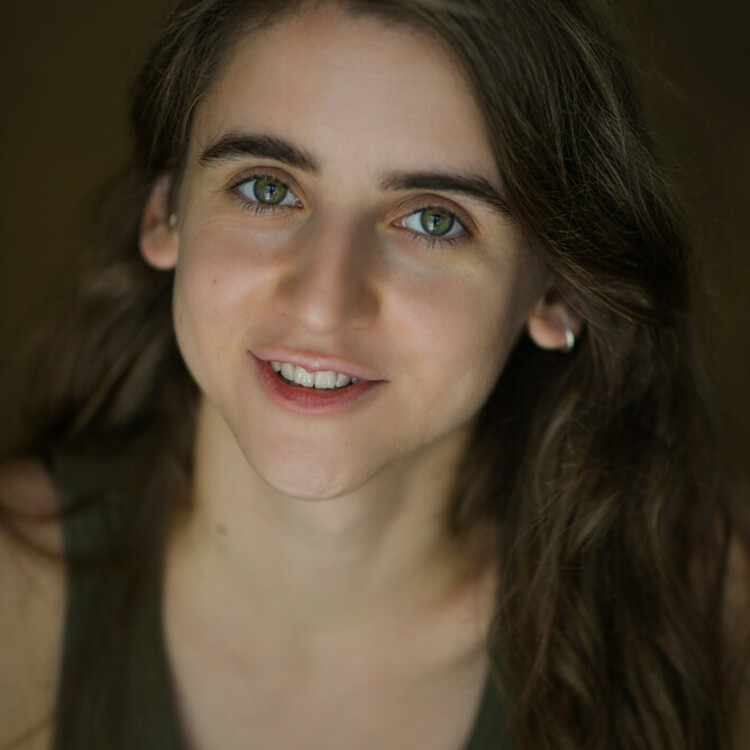
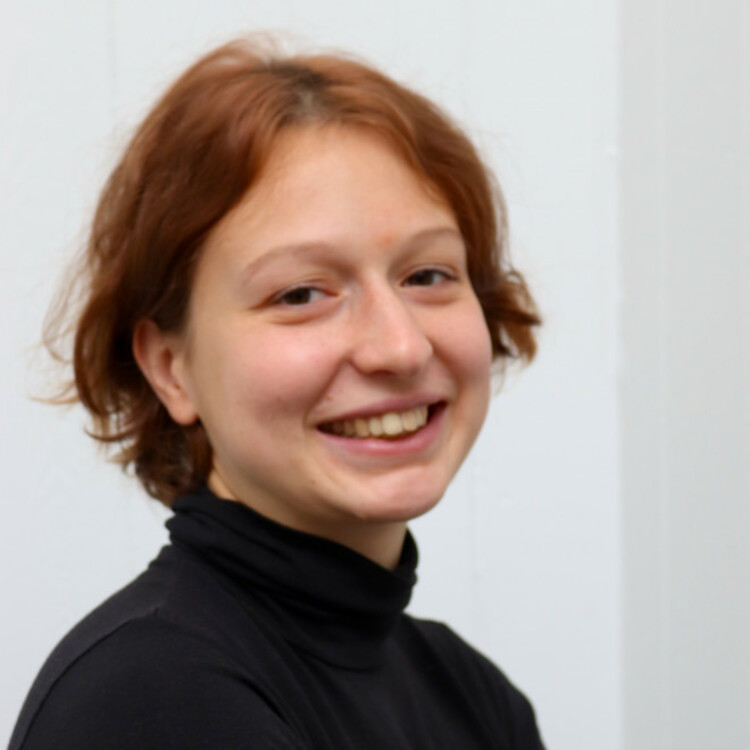
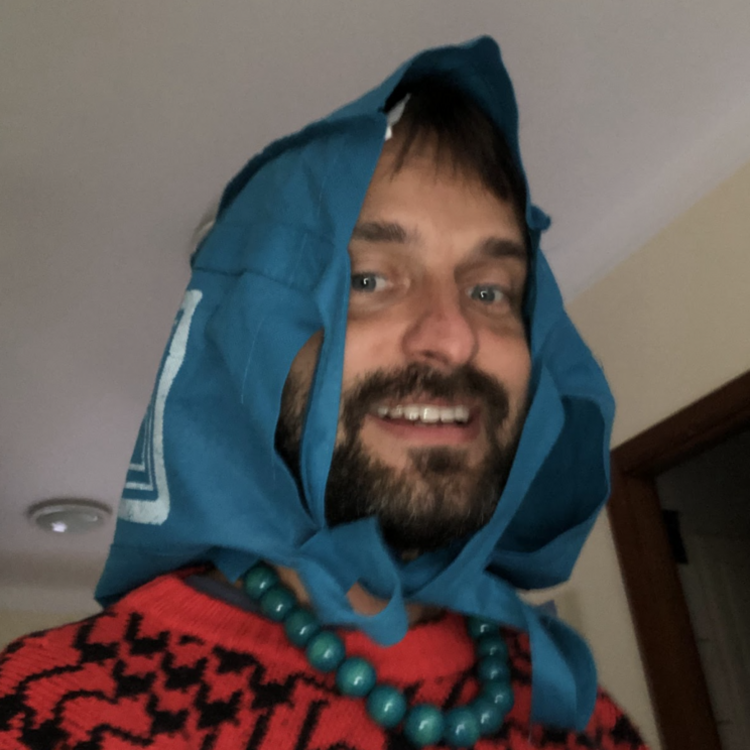
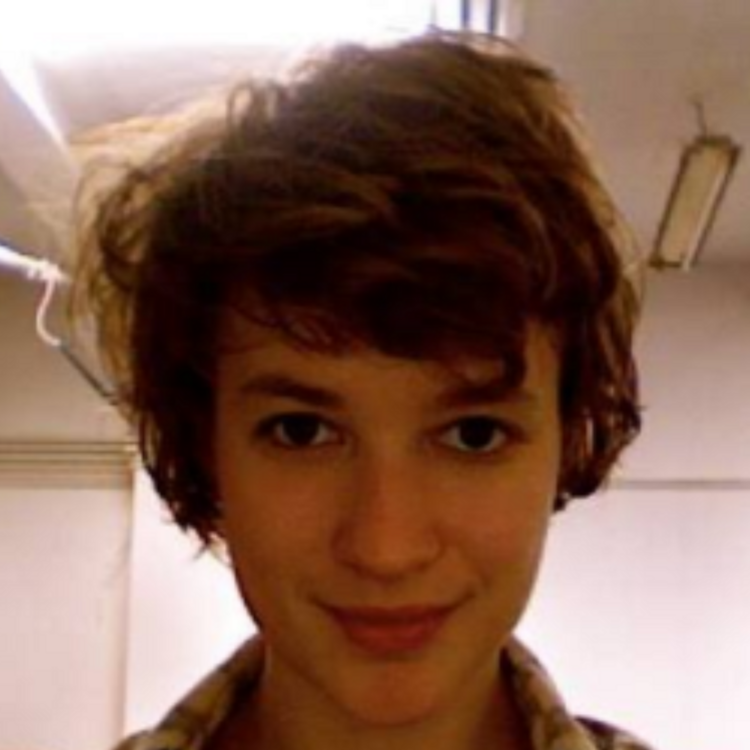
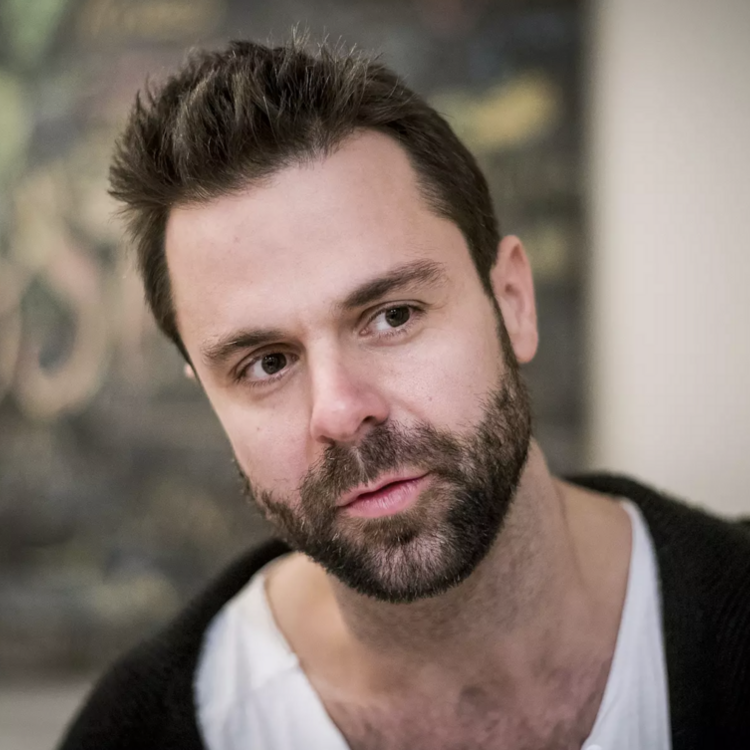
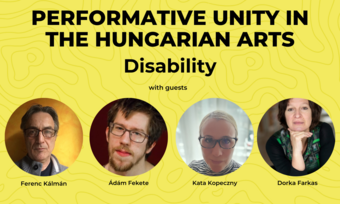






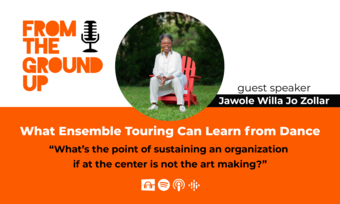


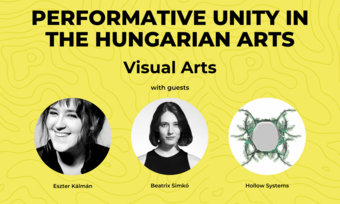



Comments
The article is just the start of the conversation—we want to know what you think about this subject, too! HowlRound is a space for knowledge-sharing, and we welcome spirited, thoughtful, and on-topic dialogue. Find our full comments policy here